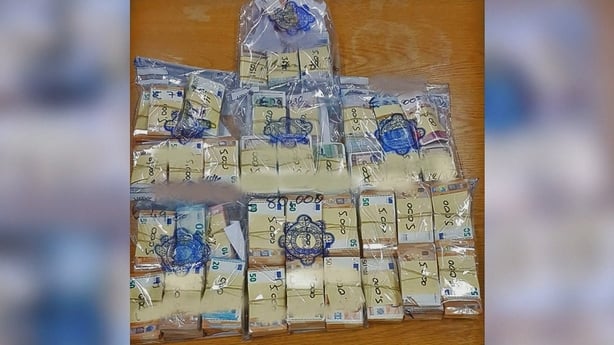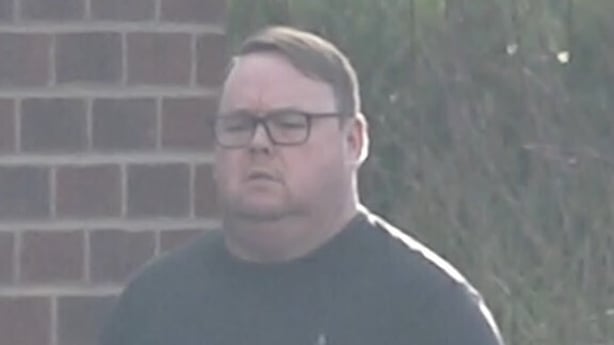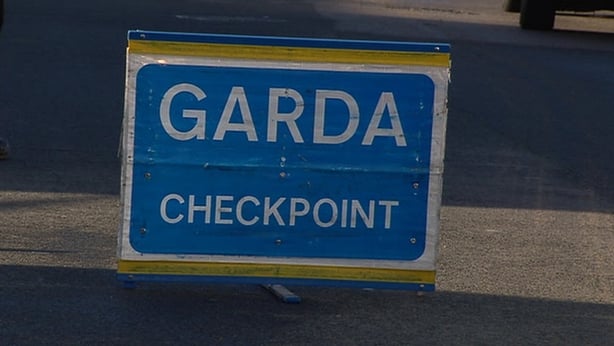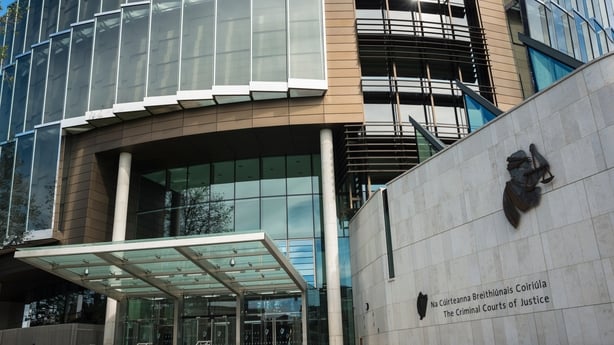Catherine Dawson sat in the company car outside the Spar Supermarket on Donore Road in Drogheda on Monday evening, 11 May last year. A community supervisor with North Dublin Home Care, which looks after elderly and disabled people, Catherine had been working remotely that day and was rostered on until 5pm. She drove into the car park at 4.59pm and waited.
At 5.22pm, a man arrived in a silver car, got out beside her, threw a black bag into the back of the white Hyundai and drove off. A minute later, Catherine's phone beeped with a text:
"1 more."
"K," Catherine replied.
At 5.55pm, a second car, a Volkswagen Passat, arrived and another man got out. He walked over to a black Mercedes; spoke to a second man there, walked back to his car, took a blue sports bag over to Catherine's car and threw it in the back.
All three cars then drove away - but they did not get far before the sirens and the blue lights lit up. Unbeknownst to them, their cover had already been blown. Detective Inspector Noel Browne from the Garda Drugs and Organised Crime Bureau had earlier received confidential information about one of the men and had set up a covert surveillance operation on him.
The target was followed as he left his Co Meath home at 5.22pm that evening and arrived at the supermarket car park half an hour later. Undercover gardaí watched as he transferred the second bag of cash. They did not know about the first bag, the black one, until they forced Catherine Dawson's car to a stop on the Donore Road.
There was over a quarter of a million euro in cash (€254,840) in the black bag. Beside it on the back seat, a blue Nike zip lock sports bag contained another €289,770 and £65,000. The handover of the two bags was captured on CCTV in the car park. In all, gardaí seized almost €620,000 (€619,970.56) of organised crime cash linked, amongst others, to the Kinahan Organised Crime Group.

Background
The mother of two sons aged 14 and 22, Catherine Dawson had an apartment that she rented while she lived in a rented house in Co Meath with her partner and younger child. Originally from Coolock in Dublin, she always worked, moving on from retail to caring for people.
Catherine was known by her colleagues and friends to be "a hard worker", a "pleasant lady", an "excellent mother" and someone who got on well with others. The 44-year-old loved her job as a community supervisor in North Dublin Home Care.
"Every day flies by and you never know what each day will bring," she said.
Catherine Dawson progressed in the job to become a highly qualified care worker with Healthcare QQI Level 5, Leadership for Equality QQI Level 8 and Dementia Care QQI Level 8. She is also a qualified Manual and Patient Moving and Handling Training Instructor.
She joined the company seven years ago as a homecare worker but was quickly promoted to supervisory assistant. Two years later, she was again promoted to community supervisor, working with disabled and elderly people and supporting homecare workers in the community. She supervised 93 carers and 240 clients.
Catherine was arrested with the bags of cash but would not tell gardaí what was in them. She was taken to Irishtown Garda Station and again made no admissions. Over the course of seven interviews, she exercised her right to silence and never said a word. She later claimed she did not know what she had gotten into.

When gardaí searched her home, they found fake Louis Vuitton designer handbags, ten high-end men's watches (three fake, seven legitimate) worth over €90,200 and a receipt for a holiday in the US for two months later, July 2020. The holiday cost €8,845.
The search team also discovered two signal blockers; a cheap one that cost around €50, and another more sophisticated and expensive model worth around €800. The devices could jam mobile networks and prevent identification of the phone and therefore also its user's location.
And while the two men arrested on the same day as Catherine had encrypted phones, she only had her work phone and iPad.
The facilitator
Catherine Dawson had, unbeknownst to her, been sucked into Thomas Maher's international organised crime facilitation network. Born and reared in Clara in Co Offaly, the 39-year-old haulage firm owner lived in a mansion in Warrington in the UK. He organised the movement of drugs and cash between Europe, Ireland and the UK for criminal gangs, including the Kinahan organised crime group.
Maher first came to the attention of the police in the UK when his name was linked to another criminal haulier, Ronan Hughes from Co Monaghan. Hughes is serving 20 years in prison for the manslaughter of 39 Vietnamese migrants who suffocated in a lorry in Purfleet in October 2019.
The tractor unit involved was once owned by Maher and was still registered in his wife's name, even after it was sold.
Maher was arrested and questioned as part of that investigation but was later released. No further action was taken against him by Essex Police in relation to the migrants' deaths but that was not the end of the matter. The UK National Crime Agency (NCA) began investigating Maher's activities.
The NCA discovered that despite the fact that Maher and his wife were on less than minimum wage for tax purposes, they lived a luxurious lifestyle. The couple owned cars worth more than £200,000, as well as jewellery and watches worth hundreds of thousands. They had also spent around £90,000 on holidays over three years.

Maher was heard on encrypted Encrochat phones in April 2020 boasting that he had been involved in organised crime for over 20 years. The messages revealed he had arranged the collection and delivery of at least 21kg of cocaine from various collection points in the Netherlands to Ireland. The couriers reported back to Maher when the drugs were picked up, transported and arrived at their final destination.
In one exchange of messages, Maher discussed the best ports to use with a co-conspirator.
"I'm at this game the last 20-odd years, pal," he said. "I'm not an overnighter, so I know the way of plays."
In another exchange, he joked how he was in a great position to take advantage once coronavirus lockdown restrictions were eased.
"Once we get this travel ban lifted... we be laughing mate, I'm telling u. That's why I'm not stressing yet," he wrote.
NCA officers kept watch on Maher over a period of seven months as he met criminal associates at hotels and in public spaces in the northwest of England to organise the trafficking of cocaine from Holland to the UK and Ireland. He also helped to facilitate the movement of large sums of cash, including the €620,000 that Catherine Dawson was caught with. Last December he was jailed for 14 years and eight months.
While Maher was at the top of the criminal network, Dawson was at the bottom.
Why a health worker?
Catherine Dawson was the ideal choice for an organised crime group to move drugs money. A healthcare worker in a company car marked with the healthcare company's name, logo, website and telephone number. She had a valid reason for being out of her home and travelling around during the early days of the Covid-19 pandemic.
She was one of thousands of people providing friendship and support to elderly and disabled people, helping them with housekeeping, meals and small jobs at their homes, and assisting them with bathing, toileting, oral hygiene, skin and catheter care. She was an essential worker who also turned and positioned bed-bound clients and applied back rubs and creams.
Catherine offered people mobility assistance and helped with walking aids and exercise plans. She took them shopping, to collect their medicines and she encouraged them to stay fully integrated in the community with trips to local amenities and cafes.

Her movements were unlikely to cause suspicion during lockdown when gardaí were seizing millions in cash and drugs from criminals who should not have been out. When stopped at a garda checkpoint, she was quickly waved through. She had no criminal convictions nor had her family or friends. She had no network of criminal contacts and no links to organised crime.
Catherine Dawson was not the focus of the Drugs and Organised Crime Bureau's investigation when they stopped her in May 2020 and they do not believe the watches and bags found in her home are connected to her. She was not in any way on "the garda radar". Her arrest that evening was, to say the least, unexpected.
Detective Garda Mary Moore accepted Catherine's defence that she was acting on the instructions of another person, and that she was "reckless" and did what she did out of "misguided trust". Her actions have, however, cost her her home, her relationship, her reputation and her livelihood. Garda vetting is required for care workers and Catherine Dawson can no longer work in healthcare.
Sentencing
Catherine Dawson says she feels ashamed, remorseful, worthless and blames herself for what she has done. She never suffered any mental health issues before, but now she suffers from stress anxiety, has seen a psychologist, is receiving counselling and is on medication.
All this can happen to a normally law-abiding person when they get involved with a serious organised international crime gang - but Catherine Dawson got nothing but misery and pain from agreeing to act as a courier for drugs money. It changed the course of her life forever.
The Special Criminal Court has convicted and jailed over 40 gangsters since the murder of David Byrne at the Regency Hotel escalated the ongoing Hutch-Kinahan feud in February 2016.
Catherine Dawson is one of the lucky ones who was allowed to walk free. She is now living in rented accommodation and is the primary carer for her 14-year-old son. Her other son, who is 22, is offering help and support.

Mr Justice Tony Hunt accepted the former healthcare worker was "foolish" and that her crime was not part of "a chain of involvement or regular participation in the laundering of sums of money".
"She just about qualifies for a non-custodial sentence," he said as he sentenced her to three years and nine months in prison, suspended for five months on condition she be of good behaviour.
However, before she walked out into the Dublin sunshine last Monday afternoon, the judge gave the mother of two a salutary warning as he pointed to the custodial door in court number 11 that leads to the holding cells.
"She had better take that chance. If she is back here for any reason of substance the sentence will be activated," he said.
"She had better devote herself to that 14-year-old boy because otherwise, she will be on her way through that door."






